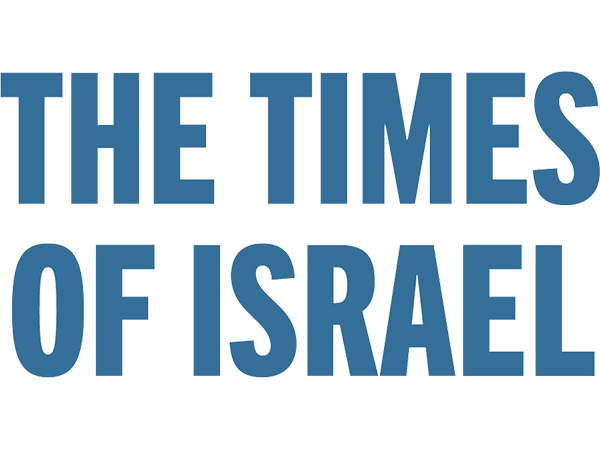
The Times of Israel
By: Tal Schneider
March 11, 2022
Marc Schneier, an influential and controversial rabbi to American celebrities and Gulf sheikhs alike, describes his role in bringing Herzog and Erdogan together
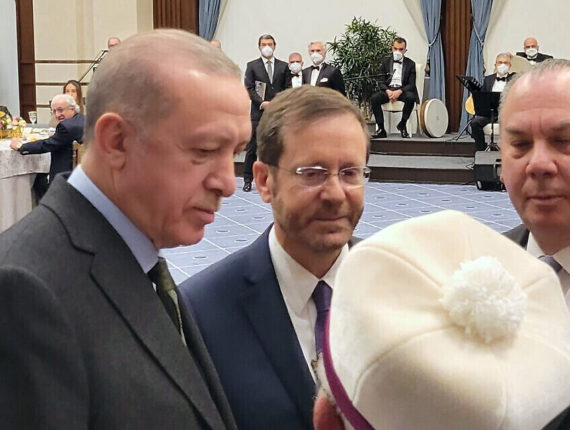
From left, Turkish President Recep Tayyip Erdogan, Israeli president Isaac Herzog and Rabbi Marc Schneier, at a reception in Ankara, Turkey, on March 9, 2022. (Courtesy: Marc Schneier)
As far as rabbis go, Marc Schneier is no stranger to the royal courts and sheikhdoms of the Arab world’s petro-kingdoms. The founder of The Foundation for Ethnic Understanding, Schneier has sought to bring Jews and Muslims together for over a decade, whirling through meetings with kings and crown princes of the United Arab Emirates, Bahrain, Qatar, and other Gulf countries.
On Wednesday, as President Isaac Herzog was meeting with Turkish President Recep Tayyip Erdogan, Schneier suddenly emerged in another Muslim capital: Ankara.
Schneier didn’t try to keep his presence there a secret. He walked through the media hall, chatting casually with reporters, many of whom know him through his work. The founder and chief rabbi of the Hampton Synagogue in Westhampton Beach, New York, Schneier has for decades carefully cultivated an image in the press as rabbi to the jet-setters, celebrities, and hedge fund whales that frequent that rarefied world.
So he was media-savvy enough to stay mum when asked why he had suddenly shown up at the palace of a Turkish autocrat in the middle of an ultra-sensitive meeting with Israel’s president that could spell a major stepping stone toward a key diplomatic rapprochement. His presence had indeed raised eyebrows. Only Turkish government officials, members of the Israeli delegation, journalists, and security personnel were present. There were no other mediators, businessmen, or clergy.
But Schneier wasn’t any old mediator. By his telling, he was the shadhan, the matchmaker, behind this brewing rekindled romance.
The first sparks appeared on July 12, when Erdogan called to congratulate Herzog on his election as president. That phone conversation cracked the ice of a decade-long diplomatic chill between the countries, formerly warm allies. This week, the thaw moved into tin roof territory with Herzog’s visit and plans to move toward a resumption of full ties.
Behind that July 12 call was not weeks or months of careful diplomacy, tentative planning, and cautious gesturing, but a chance meeting and a cross-continental moonshot, according to Schneier.
A few months before the call, Schneier had been at an iftar meal to break the Ramadan fast when he met Hasan Murat Mercan, the Turkish ambassador to the US.
Mercan told Schneier that he had been dispatched with a mandate from Erdogan to fix ties between Turkey and the American Jewish community and asked for his advice.
“So I said, listen, I can answer you with one word. And that’s ‘Israel.’ If you want Turkey to restore its relationship with the American Jews, Congress, administration, etc., the path is through Israel,” he told The Times of Israel from Istanbul, where he remained on Thursday even after the Israeli delegation had left.
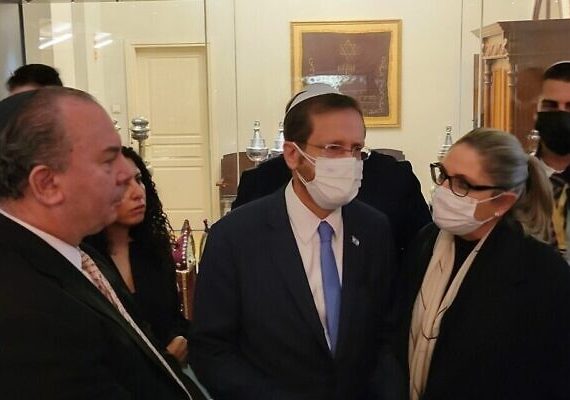
Marc Schneier, left, speaks with President Isaac Herzog and his wife Michal in Ankara Turkey, on March 9, 2022. (Marc Schneier/Twitter)
Fast forward to July 11, when Mercan was the invited speaker for a current affairs series at Schneier’s synagogue. Mercan earned a standing ovation and Schneier, seizing the energy, suggested they go upstairs to his office. There, he asked him to call Erdogan and suggest he call Herzog, who had been sworn in as president four days earlier.
“‘Let’s reach out to Erdogan now,’” Schneier recalled telling him. “‘Let’s see if he would call Herzog to congratulate him on becoming president of Israel.’”
He called Erdogan from Schneier’s office, and the next day Erdogan called Herzog. More calls would follow when Herzog’s mother died and when Erdogan caught COVID-19. And then the trip, freighted with high hopes for a diplomatic restart.
Even that first day, Schneier recalled, he was ready to go.
“I have a good relationship with the Israeli side, with Herzog, and I said, ‘Let’s start the process.’”
From school friends to powerbrokers
Herzog and Schneier first met in 1975, when they were in the same class at The Ramaz School, a Jewish day school on the Upper East Side of Manhattan. Herzog’s father Chaim Herzog, who would later become president, was at the time posted to New York as Israel’s envoy to the United Nations.
Herzog returned to Israel in 1978, but the two kept in touch. Schneier would go on to be ordained by Yeshiva University, and in 1989 and 1990, he established the Foundation for Ethnic Understanding and the Hampton Synagogue, building an international cache and press presence as “Rabbi to the stars.”
Focusing on Jewish-Black and Jewish-Muslim ties, the work has brought Schneier and his influential connections into the vortex of a Jewish-Muslim renaissance of tolerance in some corners of the Gulf. He has grown especially close to Bahrain’s King Hamad bin Isa bin Salman Al Khalifa, for whom he serves as adviser, and in the media, he is often portrayed as a Gulf monarch-whisperer, with insight into Arab royals’ views of Israel and other matters.
Official sources in Jerusalem, speaking on condition of anonymity, confirmed Schneier’s account of the Turkey diplomacy. One official called Schneier “one of the most influential Jewish figures in the wider Muslim world.”
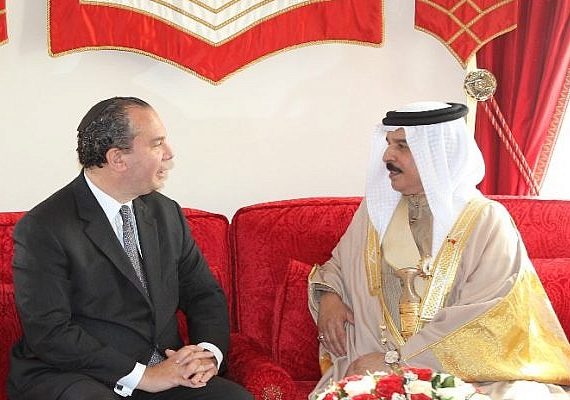
Rabbi Marc Schneier and Bahrain King Hamad bin Isa Al Khalifa. (Courtesy)
Since winning the presidency last summer, Herzog has become something of a mentor to the new government of Prime Minister Naftali Bennett and Foreign Minister Yair Lapid. The two have little experience in statecraft, and have allowed Herzog to take the lead on a number of diplomatic issues, the most prominent being moves toward a rapprochement between Turkey and Israel, after a decade of near-frozen ties.
Herzog’s role became clear in November, when an Israeli couple were arrested in Turkey. The pair said they were there on vacation and had not known it was forbidden to photograph Erdogan’s palace, but Turkey charged the pair with espionage. Israel put a battery of high-ranking officials on solving the issue, and according to Schneier, he and Ibrahim Kalin, Erdogan’s influential aide de camp, also played a role.
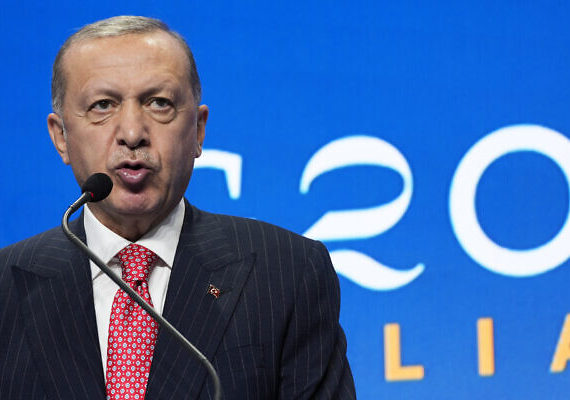
Turkey’s President Recep Tayyip Erdogan speaks during a media conference at the G20 summit in Rome, Sunday, Oct. 31, 2021. The two-day Group of 20 summit concluded on Sunday, the first in-person gathering of leaders of the world’s biggest economies since the COVID-19 pandemic started. (AP Photo/Domenico Stinellis)
The rabbi says he warned Mercan that the affair could torpedo the diplomatic progress they had made.
“I contacted the ambassador and said: ‘Everything we’ve done is going to blow up, even though there isn’t a real problem here. This is ridiculous,’” Schneier recalled. “So he made some phone calls. Everyone worked to make this thing go away. You could feel it from the Turkish side, too.”
After eight days, the couple were released.
Schneier has been recognized for his role in brokering the detente. Earlier this week, he met with Jeff Flake, a former US senator who now serves as US ambassador to Turkey. Flake thanked him for using his connections to bring the countries together.
At a state dinner for Herzog in Ankara, Schneier was a guest of honor.
With the ball rolling, Schneier will return to the US next week. In Washington, the Turkish Embassy is slated to hold a gala dinner with the heads of Jewish organizations to mark the successful meeting between Erdogan and Herzog.
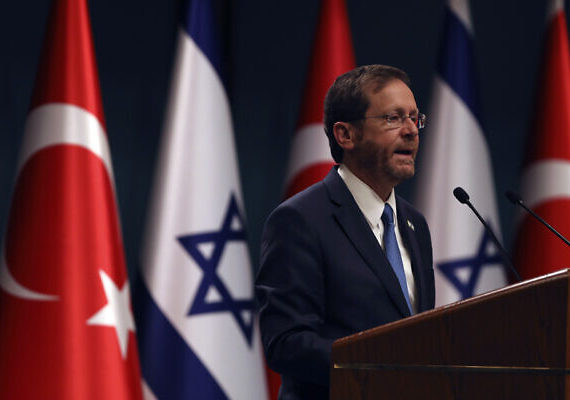
Israel’s President Isaac Herzog speaks to the media during a joint news conference with Turkish President Recep Tayyip Erdogan, in Ankara, Turkey, Wednesday, March 9, 2022. (AP Photo/Burhan Ozbilici)
Among those invited by Mercan is Mike Herzog, the Israeli ambassador to the US and Isaac Herzog’s brother.
“This is something that everyone wants,” Schneier said of Turkey’s blossoming relationship with US Jews and Israel. “[Erdogan] understood and knew that improved relations with the Jewish community will benefit Turkey.”
Copyright © 2025 Foundation For Ethnic Understanding. All rights reserved. | Privacy Policy